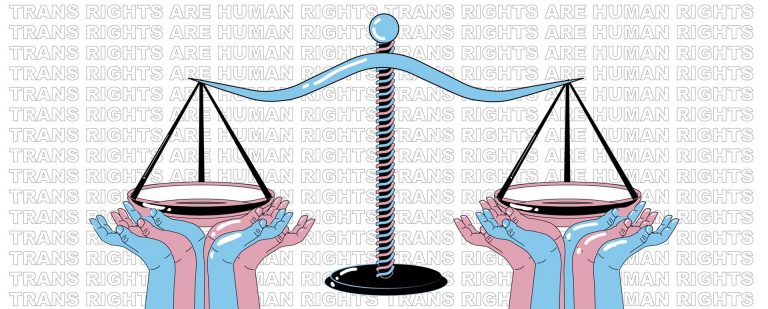Concordia student group wins a landmark human rights case in Quebec Superior Court

A Quebec Superior Court judge ruled on a landmark human rights case January 28 that advocates are hailing as a major win for trans, non-binary and intersex people in the province. For members of the Centre for Gender Advocacy (CGA), co-plaintiffs in the case, the news is a long time coming. The Concordia student–funded fee levy group first launched the constitutional challenge in 2014.
Jada Joseph (BA 19) is peer support training and drop-in coordinator at the CGA and a Concordia graduate in psychology and child studies. Joseph explains that the court ruled on 11 articles of the Quebec Civil Code, which the centre argued violate the integrity, safety, life, freedom, dignity and privacy of trans, non-binary and intersex people.
Following lengthy hearings in 2019, the court has struck down the requirement that people only be designated as male or female on official documents. It also asserted the right of trans parents to change their designation on their children’s birth certificate and be recognized as “parent” rather than just “mother” or “father.”
“This decision will ensure that every parent can identify themselves correctly, which is so important for the health and safety of trans and non-binary parents and their children,” says Jenna Jacobs, co-plaintiff and trans mother of two.
The court also eliminated the requirement to be a Canadian citizen to make a name or gender marker change, affecting immigrants and refugees.
“When I heard the news, I immediately thought of our participants without citizenship who have been denied access to proper identity documents,” says Anaïs Montenegro, outreach worker at Action Santé Travesti(e)s et Transsexuel(le)s du Québec, a Montreal by-and-for trans health organization founded in 1998.
“The decision removes a significant barrier to accessing employment, housing and health care for trans and non-binary migrants in Quebec.”
Finally, the court struck down the requirement for trans youth to be evaluated by a health professional in order to change their gender assignment.
“The victories in this decision are the culmination of many years of advocacy in the courts, in the legislature, with policy-makers, by community groups and on the streets,” says Samuel Singer (BA 04), co-plaintiff and Concordia alumnus.
Barring an appeal from the province in the 30 days following the decision, the government has until the end of 2021 to update the Quebec Civil Code in accordance with the recent ruling.
Intersex people, trans youth face ongoing challenges
Michael Lubetsky is lead legal counsel for Egale Canada, one of the organizations that intervened on the case alongside Gender Creative Kids and the LGBT Family Coalition.
Lubetsky notes that while the ruling was overwhelmingly positive, the plaintiffs were regretfully not successful on two aspects of the lawsuit. First, the court upheld the requirement to designate a child’s sex at birth without exception.
“There’s this need under the law that children be pigeon-holed as male or female right when they’re born,” Lubetsky explains. He emphasizes the damage this can cause, especially for intersex people, who are sometimes forced to undergo painful surgeries at a young age that can lead to further trauma later in life.
Secondly, the court maintained a parent’s right to veto a name change for those between 14 and 17 years of age, even though many trans youth have fraught family relationships.
“While youth may no longer need to go through a mental health practitioner, there’s still a gatekeeper present, which is their parents,” Joseph argues. “If you are a trans youth whose parent does not support your transition, that means you can’t change your name until you’re 18 years old, putting you at risk of psychological disruptions including depression and suicide.”
‘We’re fighting for students at Concordia’
For Joseph, this court case is one step in a long fight toward justice for trans, non-binary and intersex people in Quebec that far predates the work of the CGA.
“This activism has been spearheaded by trans women of colour for so many years. This is one victory in terms of ensuring the legal life of trans folks — but the fight will remain, be it legal, social, financial or health related. It’s definitely not over.”
Nonetheless, CGA staff and volunteers see this victory as one shared with the university community.
“We are fighting for the rights of trans, non-binary and intersex students at Concordia,” Joseph says, adding that the legal challenge would not have been possible without the entire student body, who support, fund and volunteer at the fee-levy organization.
For Concordians looking to support these ongoing efforts, Joseph’s suggestions include a push for more gender-neutral washrooms, guaranteed privacy for students whose documents don’t match their gender identity and more trans-awareness training.
Find out more about the Centre for Gender Advocacy, a Concordia student fee-levy organization.




